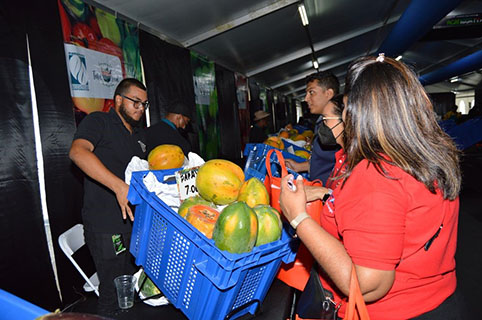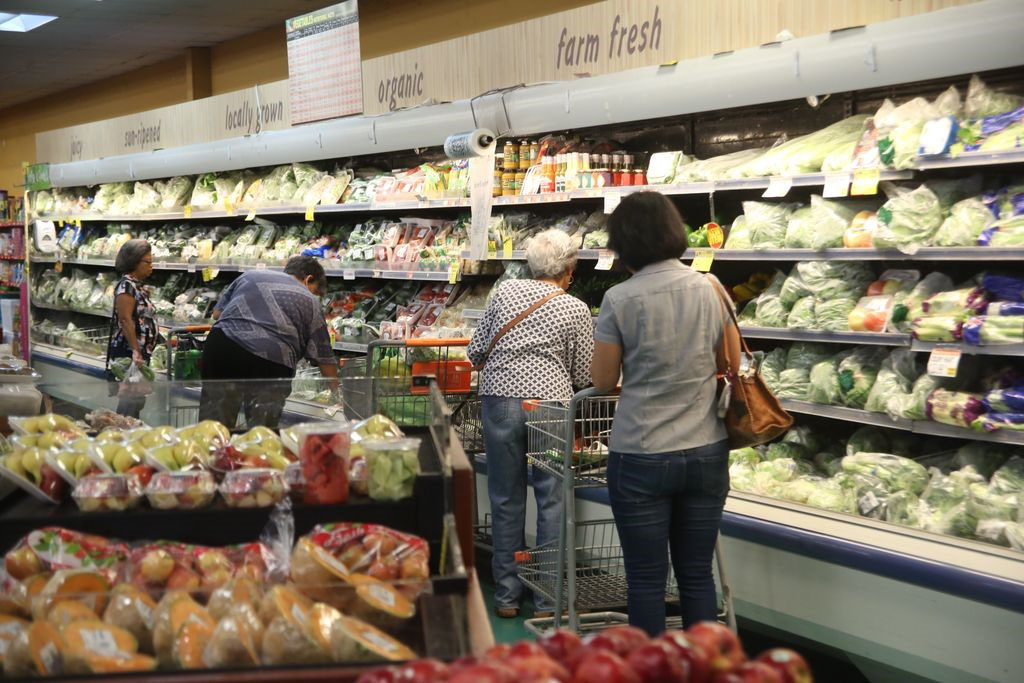By Shirley Bahadur
With regional governments and its private sector urging more agriculture production as a way of protecting the Caribbean Community from the risk of food shortages, comes word from the President of the local Supermarket’s Association that there remains the challenge of consistency, quality and reliability of agriculture products…
In the past weeks T&T has held two major agri expos-one in south and the other in north-to promote local eating while highlighting the many benefits of becoming part of the sector including establishing lucrative businesses.

“In T&T when you’re talking about agriculture, despite all the things that came out of the last few days, we still have to get the fundamentals correct; predial larceny is still a big thing as well as land grabbing issues. And there’s still a lot of crime and thefts. Farmers fed up get thief out. Those are still real issues that need to be addressed,” Diptee said, emphasising that farmers must feel safe and protected.
“I can’t tell you how many farmers have told me they are scared for their lives. Some of them are saying they have been advocating arming farmers for a very long time,” Diptee added.
However, he said the association continues to work with bodies like NAMDEVCO and farmers’ groups to make more goods available in local supermarkets.
“We don’t directly deal with NAMDEVCO. We have tried in the past but we are currently building on that relationship a lot more,” Diptee said.
He noted that one of the main thrusts of expo was promoting the farmers’ registry in a ‘big way’ to help get more goods into the stores.
Additionally, Diptee said the Caribbean Supermarkets Association was launched last Friday to also work more closely with the farming communities both locally and regionally.
“One of the ideas where that is concerned is if our Government and the Guyanese Government are serious about agriculture and they are willing to assist with all the red tape, like dealing with infrastructure development, including access roads, then that is something we want to work more closely with them on because they have to bring it to market in T&T and we want to inform that process,” Diptee explained.
Additionally, another highlight of the expo was pushing the farmers’ registry which Diptee said is meant to have more produce into stores.
Members of the public look at the paw paw on display at the Namdevco booth at the Agri Investment Forum and Expo 11 at the Queen’s Park Savannah, Port-of-Spain, yesterday.
ANISTO ALVES
However, he emphasised farmers remain a vulnerable group, living from pay check to pay check.
“As soon as they have produce they want to get it off their hands which is where the middlemen come in. They buy directly from the farmers and this is another layer you have to navigate,” Diptee added.
Moving forward he recommended Guyana can be a lucrative market for goods like wheat, corn and soya.
“This is especially important where you could look to reduce the transport cost and remove the tariffs to implement the ease of trade and have no barriers to entry among the islands.
‘The potential is there for that because cereals, for instance, continue to be one of the biggest items when you look at the $6 billion import bill,” Diptee said.
Livestock production can also be examined to plug the gap, as Diptee added Caricom already offers a lot of production in this area.
The Business Guardian also reached out to Nirmalla Debysingh-Persad, CEO of challenges remain consistency, quality and reliability who said critical to an increase of produce on the shelves must be demand from consumers.
Noting that supermarkets usually responds to demand Debysingh-Persad explained, “If the consumers demand more local fresh fruits and vegetables on the shelves then it’s going to go there. So it must be a push from the market end to have the products in the supermarket.”
She said this also goes with quality and the guarantee of safety along with consistency and most importantly the price is a factor.
‘The price must be right for the customer to afford it and to be able to continuously buy the items for their families,” Debysingh-Persad added.
She said while having more goods on the shelves is a work in progress, the farmers’ markets are good starting points as many supermarkets also visit these locations to make such connections.
“I could comfortably say there are supermarkets which have forged linkages with the farms and buy directly through the farmers’ market initiative. So you find there are unique niche products in the supermarkets and they are affordable because they are purchased directly from the farms. This also encourages more production and better quality of goods,” Debysingh-Persad added.
Vernon Persad of Persad’s D Food King also agreed many supermarkets already purchase directly from their local community farmers who in turn are their customers as well.
He said major supermarket chains like his supermarket and even minor players allocate for all categories of local produce, vegetables, fruits and even condiments /seasoning.
All these supermarkets buy directly from local farmers through direct supply arrangements or with contracted produce and vegetable suppliers who have distribution contracts with supermarkets, who in turn work with their farmers directly at the farm gate or from regional wholesale NAMDEVCO markets like Macoya, Port-of-Spain and Debe,” Persad added.





